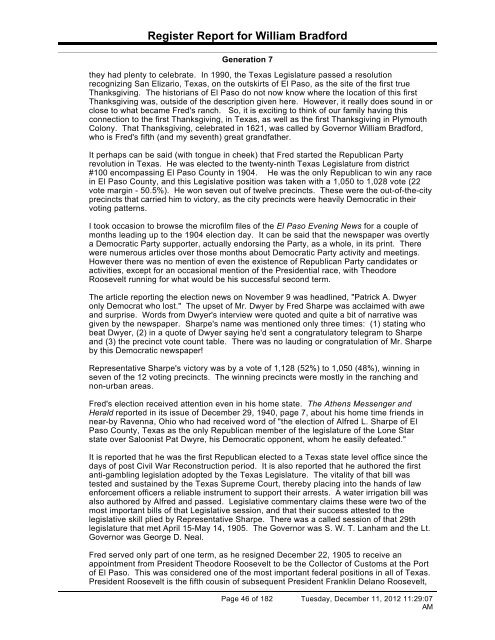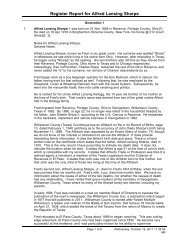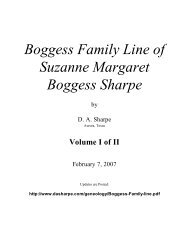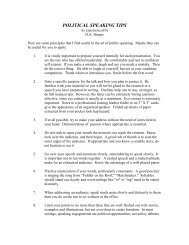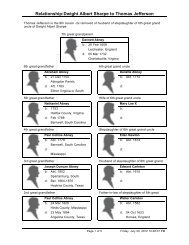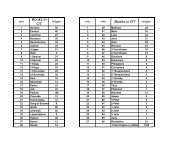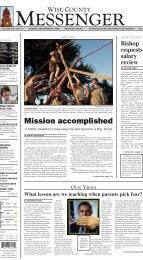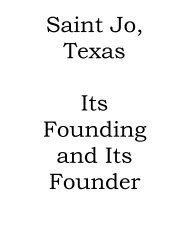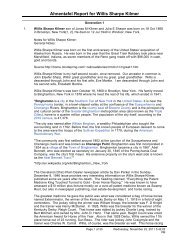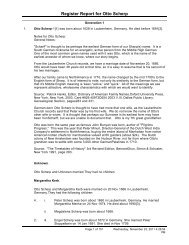My Descending from Gov. - D. A. Sharpe
My Descending from Gov. - D. A. Sharpe
My Descending from Gov. - D. A. Sharpe
Create successful ePaper yourself
Turn your PDF publications into a flip-book with our unique Google optimized e-Paper software.
Register Report for William Bradford<br />
Generation 7<br />
they had plenty to celebrate. In 1990, the Texas Legislature passed a resolution<br />
recognizing San Elizario, Texas, on the outskirts of El Paso, as the site of the first true<br />
Thanksgiving. The historians of El Paso do not now know where the location of this first<br />
Thanksgiving was, outside of the description given here. However, it really does sound in or<br />
close to what became Fred's ranch. So, it is exciting to think of our family having this<br />
connection to the first Thanksgiving, in Texas, as well as the first Thanksgiving in Plymouth<br />
Colony. That Thanksgiving, celebrated in 1621, was called by <strong>Gov</strong>ernor William Bradford,<br />
who is Fred's fifth (and my seventh) great grandfather.<br />
It perhaps can be said (with tongue in cheek) that Fred started the Republican Party<br />
revolution in Texas. He was elected to the twenty-ninth Texas Legislature <strong>from</strong> district<br />
#100 encompassing El Paso County in 1904. He was the only Republican to win any race<br />
in El Paso County, and this Legislative position was taken with a 1,050 to 1,028 vote (22<br />
vote margin - 50.5%). He won seven out of twelve precincts. These were the out-of-the-city<br />
precincts that carried him to victory, as the city precincts were heavily Democratic in their<br />
voting patterns.<br />
I took occasion to browse the microfilm files of the El Paso Evening News for a couple of<br />
months leading up to the 1904 election day. It can be said that the newspaper was overtly<br />
a Democratic Party supporter, actually endorsing the Party, as a whole, in its print. There<br />
were numerous articles over those months about Democratic Party activity and meetings.<br />
However there was no mention of even the existence of Republican Party candidates or<br />
activities, except for an occasional mention of the Presidential race, with Theodore<br />
Roosevelt running for what would be his successful second term.<br />
The article reporting the election news on November 9 was headlined, "Patrick A. Dwyer<br />
only Democrat who lost." The upset of Mr. Dwyer by Fred <strong>Sharpe</strong> was acclaimed with awe<br />
and surprise. Words <strong>from</strong> Dwyer's interview were quoted and quite a bit of narrative was<br />
given by the newspaper. <strong>Sharpe</strong>'s name was mentioned only three times: (1) stating who<br />
beat Dwyer, (2) in a quote of Dwyer saying he'd sent a congratulatory telegram to <strong>Sharpe</strong><br />
and (3) the precinct vote count table. There was no lauding or congratulation of Mr. <strong>Sharpe</strong><br />
by this Democratic newspaper!<br />
Representative <strong>Sharpe</strong>'s victory was by a vote of 1,128 (52%) to 1,050 (48%), winning in<br />
seven of the 12 voting precincts. The winning precincts were mostly in the ranching and<br />
non-urban areas.<br />
Fred's election received attention even in his home state. The Athens Messenger and<br />
Herald reported in its issue of December 29, 1940, page 7, about his home time friends in<br />
near-by Ravenna, Ohio who had received word of "the election of Alfred L. <strong>Sharpe</strong> of El<br />
Paso County, Texas as the only Republican member of the legislature of the Lone Star<br />
state over Saloonist Pat Dwyre, his Democratic opponent, whom he easily defeated."<br />
It is reported that he was the first Republican elected to a Texas state level office since the<br />
days of post Civil War Reconstruction period. It is also reported that he authored the first<br />
anti-gambling legislation adopted by the Texas Legislature. The vitality of that bill was<br />
tested and sustained by the Texas Supreme Court, thereby placing into the hands of law<br />
enforcement officers a reliable instrument to support their arrests. A water irrigation bill was<br />
also authored by Alfred and passed. Legislative commentary claims these were two of the<br />
most important bills of that Legislative session, and that their success attested to the<br />
legislative skill plied by Representative <strong>Sharpe</strong>. There was a called session of that 29th<br />
legislature that met April 15-May 14, 1905. The <strong>Gov</strong>ernor was S. W. T. Lanham and the Lt.<br />
<strong>Gov</strong>ernor was George D. Neal.<br />
Fred served only part of one term, as he resigned December 22, 1905 to receive an<br />
appointment <strong>from</strong> President Theodore Roosevelt to be the Collector of Customs at the Port<br />
of El Paso. This was considered one of the most important federal positions in all of Texas.<br />
President Roosevelt is the fifth cousin of subsequent President Franklin Delano Roosevelt,<br />
Page 46 of 182 Tuesday, December 11, 2012 11:29:07<br />
AM


